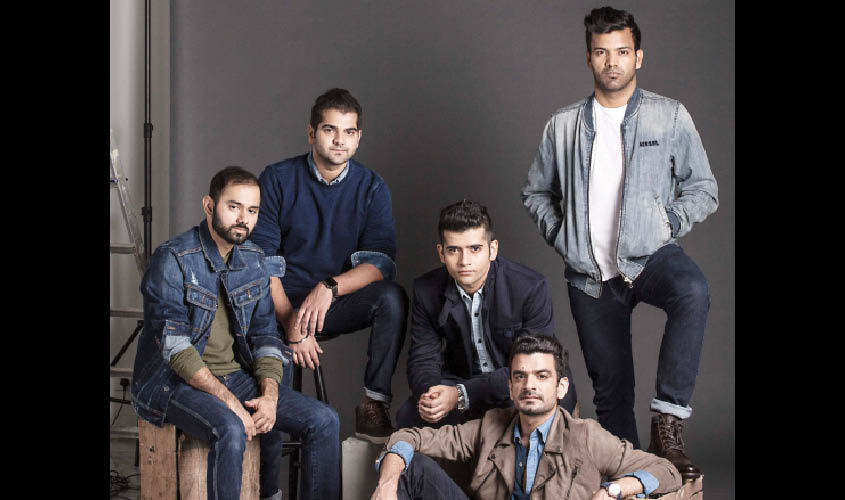The Yellow Diary is a band that has made a name for itself in the indie music scene in less than half a decade. The Mumbai-based alternative rock outfit has released six songs in two EPs, in addition to performing hundreds of live shows across the country. They are now signed with Sony Music India.
The band members—Himonshu Parikh (music production, keyboard, backing vocals), Rajan Batra (vocals, songwriting), Vaibhav Pani (guitar), Sahil Shah (drums) and Stuart DaCosta (bass)—recently sat down to chat with us about their music, their creative process and their live performances.
To begin with, Himonshu told us the story behind the band’s name. “Essentially, all our songs are about the things that have happened to us or around us. These are experiences that one would write about in their personal diary. So all the songs are like different pages of a diary where you put in material every day. That explains the diary part of the name,” he said.
And the word yellow also comes from an interesting place. According to Himonshu, yellow is a mysterious colour which usually denotes happiness and brightness. But it also has a very dark side to it, suggesting cynicism of a kind. “So just like the colour yellow, and every page in the diary, incorporates a range of emotions, every song of ours has a different emotion. That’s why the band is called The Yellow Diary,” he said.
Their compositions are lyrically rich, and the band members hope to revive the old tradition of making use of thought-provoking poetry in rock songs. The guitarist Vaibhav describes their style of music as “poetry with rock”: “All the songs have deep, relatable meanings, fused with rock and electronic soundscape.”
Himonshu calls the band’s songwriter, Rajan, a modern-day poet who finds inspiration in everyday life. To this, Rajan responded, “Each day comes with a lot of experience. The key is to observe and absorb. Whatever you have experienced comes out as a melody which reminds you of a certain memory each time. For me, it automatically comes out on paper.”
Even though the five members of the band are equally passionate about music, they all came to music from different professional fields. Himonshu was an engineer, Rajan, a naval cadet, Vaibhav, an IT consultant, Sahil was taking care of the family business, and Stuart worked as an account executive.
So how did they all come together to form the band? Himonshu and Rajan met through a friend and worked together on a track
After this, the trio felt that they should make a full-fledged band and go live with their music. “We didn’t want to limit ourselves to studio projects. We wanted to do it the old-fashioned way. So we got in touch with Sahil, who was a friend, and Stuart, who had performed with him earlier. And then, we five were a band,” said Himonshu.
After signing with Sony Music in 2017, the band released its first EP, rightly named Marz. It had three songs, “Afzai”, “Kashmir” and the re-released version of “Marz”, the song that had brought them together in the first place. Today, “Marz” has over six million views on YouTube, which is quite an accomplishment for a fairly new band.
The Yellow Diary’s second EP, called Izafa (which means advancement in Urdu), released last December. The band thinks it represents the next step in their musical journey. It consists of three songs—“Dheere Se”; “Buniyaad”; and a remake of Nusrat Fateh Ali Khan’s “Tera Jeya Hor Disda”. About this, Rajan said, “When we started three years back, the goal was just to make good music and to go out and perform. We wanted to be at different venues and in front of various audiences. We still have the collective dream of achieving more, which Izafa is about. There should always be progress.”
Every member of the band brings his unique style to the table. Himonshu is responsible for production, samples and backing vocals. Rajan infuses his melodies with Indian classical music in a contemporary manner. Vaibhav offers a fresh perspective on the strings, while Stuart pushes the sonic boundaries on bass. Adding to this crew is Sahil, who uses an eclectic blend of jazz and modern drum theory.
The members have a great chemistry, and admire each other’s rhythmic sensibilities. Stuart tells us that the ideas always keep flowing. Being multi-lingual, the band’s lyrics are personal and strike a chord with the listeners.
The Yellow Diary has performed at prestigious venues across the country. Vaibhav said, “We express ourselves through our songs. That is something really close to all five of us. When we perform our music on the stage, in front of a crowd, we share that experience with all those people. We play our original compositions and the response has been overwhelming, be it in restaurants or colleges or at other venues.”
To this, Sahil added, “The best part about performing live is that you truly understand how much people are enjoying the songs. That is an unparalleled feeling.” He credits a part of the band’s success to the growing craze for live shows, due to which opportunities in the independent music sector are growing apace.
Social media is also helping the band to strengthen their network and reach out to new listeners around the world. And the emergence of digital platforms in general has proved to be a great advantage for The Yellow Diary. Himonshu said, “Digital platforms are huge for any modern or up-and-coming artiste these days. It’s been a big part of our journey. Our original ‘Marz’ video got the attention of people such as Vishal Dadlani, Raghu Dixit and more from the industry. That led us to Sony Music India. They probably wouldn’t have discovered us otherwise.”

